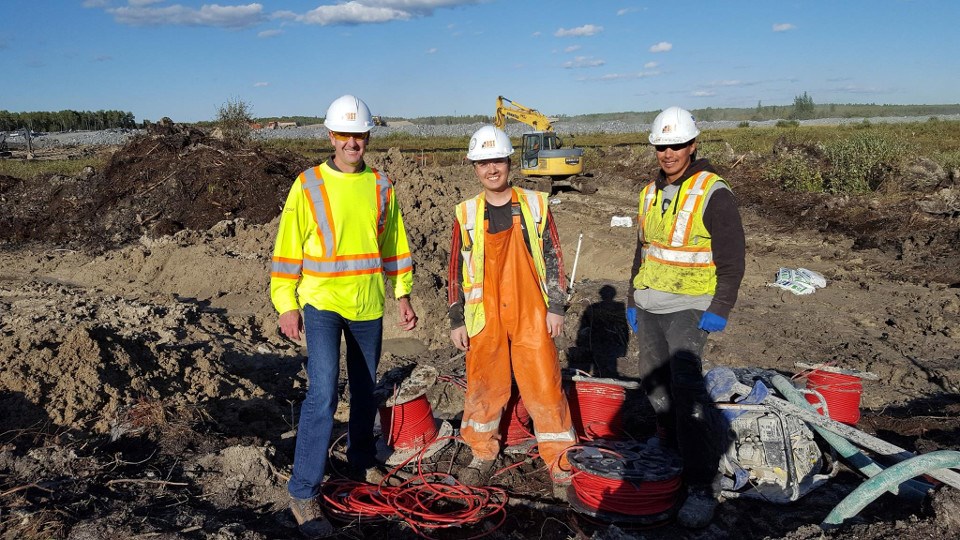Ed Collins’ teachings about Aboriginal culture seem to be rubbing off on some of his coworkers at DST Consulting Engineers.
The manager of Indigenous relations said it’s not uncommon for a few of his non-Indigenous colleagues to come into his office to request a smudge ceremony as a stress reliever.
Some feel the need for a spiritual uplift or a mental cleansing to alleviate negative feelings.
“We’re not healing the sick; we’re just healing the mind, the soul and body,” said Collins, a member of the Fort William First Nation.
DST is a consulting engineering firm specializing in environmental engineering, geotechnical engineering, materials testing, and demolition.
In the DST boardroom in Thunder Bay, where Collins is based, there’s a basket of small tobacco pouches to remind staff members of the custom of presenting the traditional gift when approaching a community Elder.
Understanding the spiritual and cultural sides of Canada’s First Nations people is but one aspect of building a harmonious and longstanding relationship between communities and industry.
Collins, who’s created the Indigenous relations policy for the company, has crafted a cultural sensitivity workshop, Walk in My Moccasins. He's been tasked to roll it out to the 2,400 staff with DST and the subsidiaries of the parent company, Englobe.
Much of the material gathered is drawn from his own career in community development and the personal experiences and teachings of his own Anishinabek family members.
As with any prospective business relationship, it’s all about creating a favourable first impression.
Small gestures and recognitions can make a big difference.
Want to read more stories about business in the North? Subscribe to our newsletter.
Collins advises when making a presentation at a community gathering, extend greetings by acknowledging the First Nation community, its traditional territories, and its respective treaty area.
“That weighs, a lot.”
In working the other side of the street, as an economic development officer with Fort William First Nation for 14 years, he witnessed more than his share of first-meeting faux pas.
“I’ve had companies that are very respectful, that brought tobacco, and there were other ones that said, we really don’t like working with First Nations because you people mismanage money.”
Collins reminds us that paving the way to any harmonious business relationship is as easy as grabbing a cup of coffee to break the ice.
“If we knew who each other were, it would make it a lot simpler when we were doing business,” he said. “It comes back to knowing each other first.”
Prior to joining DST in January 2019, Collins said the company already enjoyed a good rapport with many First Nations.
He’s just refining what they’ve already established. Collins credits his employer with giving him some leeway on his approach to programming.
His presentation is described as a starting point to build a foundation for understanding Anishnawbe culture. It covers the universal symbol of the Eagle Feather and its connection to the Creator, and how the four colour quadrants of the Medicine Wheel are incorporated into the lives of the Anishinabek people.
“I utilize my own stories. My great-grandmother told me the four colours were the colours of people on earth. If we work together we can accomplish anything.”
But the main thrust of his workshop is to simply educate and clear up any misconceptions about First Nations people.
He starts with the basics of explaining what a treaty is, what makes an Aboriginal person Aboriginal, what a status card is, and why the Indian Act was established and how monies are dispensed.
Collins even delves into the history and societal impact of the residential school system, something, he finds, that many 20- and 30-somethings in the company have little knowledge of.
But it’s vitally important to understand and recognize its emotional underpinnings in their discussions with community Elders.
In outlining his day-to-day duties, Collins said it can involve preparing staff for a visit to a First Nation, providing community contacts, and reviewing the wording in any documents that might go into a proposal.
“A lot of First Nations don’t like the ‘C’ word, consultation. I make sure it’s taken out.”
Though Collins struggles to find a more suitable, alternative word, he said many communities simply aren’t fond of government vernacular.
“When you talk consultation with communities, they seem to clam up because that’s the checkmark by the federal and provincial governments; okay, we consulted with the First Nations, got what we needed and they walk away.”
Sometimes, if requested, he will accompany DST staff on a community visit. With Englobe’s acquisition of DST in 2018, Collins said his coverage area is coast to coast.
“Now our sister companies are now starting to phone me because they realize what my role here is now.”




